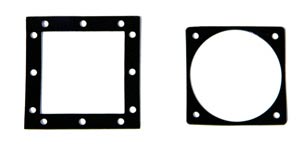EMI Shielding Products
- Custom Gasket Fabrication
- Connector Gaskets
- Bonded O Ring
- Custom Gaskets
- Conduct-O-Knit Knitted Wire Mesh
- Conduct-O-Seal Combo Gasket
- Conduct-O-Elastomer
- Conduct-O-Seal Oriented Wire in Silicone Gasket Material
- Conduct-O-Mesh Tape
- Conduct-O-Foam
- Conduct-O-Bond
- Optical Filters For Electronic Displays
- Shielded Vent Panels
- ESC Board Level Shielding
- 300 Series
Are EMI Shields Effective Against Electromagnetic Interference?
The simple answer to this question is yes; these devices effectively do their job. However, it is essential to recognize how the effectiveness of EMI shields is quantified. An effective EMI shield protects devices and internal components from harmful electromagnetic interference. Another way to think of this is to take the strength and intensity of an EMI signal before and after shielding has been installed.
Now that we recognize what individuals quantify as effective, it is crucial to understand how shielding effectiveness is measured and calculated. Although there are several ways to measure the effectiveness of an EMI shield, the primary way is through attenuation. This measurement utilizes the strength of an interfering signal at two different points, which are after the shield and before the device is shielded. During measurements, the intensity of the signal is looked for, and its result is referred to as amplitude.
 Many factors affect the effectiveness of EMI shields; however, the most significant factor is material selection. Base materials for shields, often fluorosilicone or silicone, do not provide disruptive signal characteristics. Therefore, filler materials are added that do the work of a shield. Silver and silver alloys, like silver aluminum, silver nickel, and silver-copper are often popular choices. Nickel graphite is also often used. The material choice affects performance characteristics, and the price of both budget and application needs to be considered.
Many factors affect the effectiveness of EMI shields; however, the most significant factor is material selection. Base materials for shields, often fluorosilicone or silicone, do not provide disruptive signal characteristics. Therefore, filler materials are added that do the work of a shield. Silver and silver alloys, like silver aluminum, silver nickel, and silver-copper are often popular choices. Nickel graphite is also often used. The material choice affects performance characteristics, and the price of both budget and application needs to be considered.
Lastly, you need to ensure that the seal of the EMI gasket is perfect because any imperfections disrupt the performance of the shield, no matter how effective the shield is built. If there are gaps between the enclosure and the protective device, it could lead to issues with EMI.
Related Reading about EMI Shielding
- Finger Stock GasketsElectromagnetic interference (EMI) can be damaging to both people and electronic devices. Because of this, many industries are required to provide EMI shielding to protect against any interference.
- What Causes RF Interference
- Using Shields and Filters
- Different Types of EMI Shielding Devices
- Different Applications for Wire Oriented Silicone Gaskets



